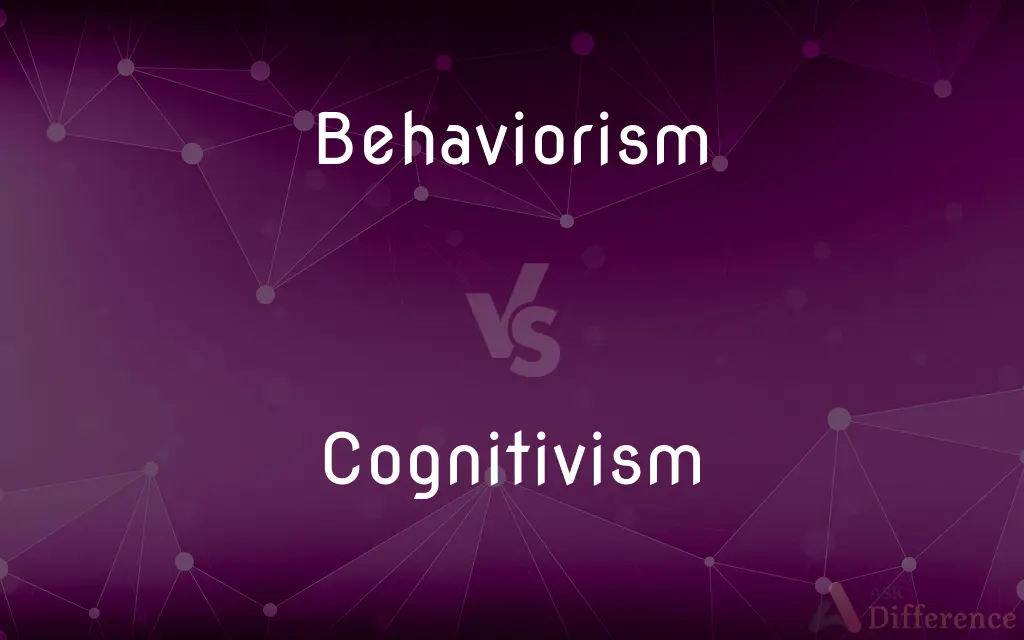Behaviorism vs. Cognitivism — What's the Difference?
By Maham Liaqat & Urooj Arif — Published on March 8, 2024
Behaviorism focuses on observable behaviors and external stimuli, while cognitivism explores internal mental processes and how they influence learning.

Difference Between Behaviorism and Cognitivism
Table of Contents
ADVERTISEMENT
Key Differences
Behaviorism and cognitivism are two foundational theories in psychology, each offering a different perspective on how learning occurs. Behaviorism, established by figures like John B. Watson and B.F. Skinner, emphasizes the role of environmental stimuli in shaping observable behaviors through conditioning. It suggests that all behaviors are learned through interaction with the environment, disregarding innate or internal processes.
Cognitivism, on the other hand, emerged as a response to the limitations of behaviorism, with key contributors such as Jean Piaget and Jerome Bruner. It focuses on the inner mental activities that facilitate learning, such as thinking, memory, knowing, and problem-solving. Cognitivists argue that the mind actively processes information, and learning involves understanding, organizing, and applying information, not just reacting to stimuli.
Behaviorism relies heavily on reinforcement and punishment to modify behavior, whereas cognitivism employs strategies that enhance comprehension and memory, such as metaphors, analogies, and conceptual mapping. This shift from external to internal emphasizes the importance of cognitive processes in understanding how information is received, processed, stored, and recalled.
Behaviorism's approach is often applied in settings that benefit from observable and measurable outcomes, such as in classroom management and behavioral therapy. Cognitivism, however, is more prevalent in designing educational curricula that aim to develop critical thinking and understanding, highlighting its influence on instructional design and technology-based learning.
Both theories contribute valuable insights into the learning process. Behaviorism underscores the impact of the environment and experiences on behavior, while cognitivism opens the door to understanding the complexities of the human mind and its capacity for knowledge and innovation.
ADVERTISEMENT
Comparison Chart
Focus
Observable behavior and external stimuli
Internal mental processes and how they influence learning
Key Contributors
John B. Watson, B.F. Skinner
Jean Piaget, Jerome Bruner
Learning Process
Through conditioning and interaction with the environment
Through understanding, organizing, and applying information
Strategies
Reinforcement and punishment
Metaphors, analogies, conceptual mapping
Applications
Classroom management, behavioral therapy
Educational curricula, instructional design, technology-based learning
View on Mind
Not considered in learning processes
Actively processes and organizes information
Outcome Measurement
Based on changes in observable behavior
Based on changes in understanding and cognitive development
Compare with Definitions
Behaviorism
A theory focusing on observable behaviors and their modification through conditioning.
Using rewards to encourage classroom participation applies behaviorism.
Cognitivism
Focuses on the mental processes involved in learning.
Cognitivism studies how information processing leads to understanding.
Behaviorism
Emphasizes the environment's role in shaping behavior.
Behaviorism explains learning as a response to external stimuli.
Cognitivism
Utilizes strategies to enhance memory and understanding.
Cognitivism applies analogies to make complex information relatable.
Behaviorism
Views learning as a process of behavior change.
Behaviorism measures learning by observable changes in behavior.
Cognitivism
Emphasizes internal cognitive structures.
Cognitivism explores how memory and thinking affect learning.
Behaviorism
Relies on reinforcement to promote desired behaviors.
Behaviorism employs positive reinforcement to increase on-task behavior.
Cognitivism
Believes in the active role of learners in processing information.
Cognitivism sees learners as active participants in their learning.
Behaviorism
Ignores the internal mental state in the learning process.
Behaviorism does not consider what learners think or feel.
Cognitivism
Considers the mind as central to learning.
Cognitivism investigates how knowledge is acquired, organized, and used.
Behaviorism
An approach to psychology focusing on observable behavior which, generally assuming that behavior is determined by the environment and denying any independent significance for mind, largely ignores any pathophysiological processes which may, or may not, underlie subjective, behavioral phenomena.
''Behaviorism is considered by most philosophers of medicine, to be an expression of the weaker, minimalist interpretation of the 'medical model' of clinical psychology because it focuses the study and classification of mental disorders upon a phenomenological, rather than a pathophysiological, approach to the subject.
Cognitivism
(philosophy) The view that ethical sentences express propositions and are therefore capable of being true or false.
Behaviorism
An approach to psychology that emphasizes observable measurable behavior.
Cognitivism
(psychology) The view that mental function can be understood as the internal manipulation of symbols according to a set of rules.
Behaviorism
An approach to psychology that emphasizes observable measurable behavior
Common Curiosities
How does cognitivism differ from behaviorism?
Cognitivism focuses on internal mental processes and how they influence learning, unlike behaviorism, which focuses on external behaviors and stimuli.
What is behaviorism in psychology?
Behaviorism is a theory that focuses on observable behaviors and the ways they're shaped by external stimuli.
Why is cognitivism important in education?
It highlights the importance of understanding how students think and process information, leading to more effective teaching strategies.
What are the limitations of behaviorism?
It overlooks the mental processes involved in learning, focusing solely on observable behaviors.
How do behaviorism and cognitivism view the mind?
Behaviorism largely ignores the mind's role in learning, while cognitivism views the mind as actively involved in processing information.
How does cognitivism impact instructional design?
It influences the creation of educational content that fosters understanding, critical thinking, and problem-solving.
What role does reinforcement play in behaviorism?
Reinforcement is key to modifying behavior, with positive reinforcement used to encourage desired behaviors and negative reinforcement to discourage unwanted ones.
Can behaviorism and cognitivism be integrated in teaching?
Yes, integrating both can create a comprehensive approach, using behaviorism for behavior management and cognitivism for cognitive skills development.
How does cognitivism address the learning process?
It examines the complex processes of learning, including how information is received, processed, and retained.
What strategies are unique to cognitivism?
Strategies like conceptual mapping and using analogies are unique to cognitivism, designed to enhance learning by linking new information to existing knowledge.
How do behaviorism and cognitivism measure learning outcomes?
Behaviorism measures learning through changes in behavior, while cognitivism looks at changes in understanding and cognitive development.
What is an example of cognitivism in the classroom?
Using story problems in math to help students apply mathematical concepts to real-world situations is an example of cognitivism.
What is a practical application of behaviorism?
Behavior modification programs in schools and therapy settings use behaviorism to change problematic behaviors.
Can behaviorism explain emotional learning?
Behaviorism struggles to explain emotional learning, as it focuses on observable behaviors rather than internal emotional states.
Why did cognitivism emerge as a theory?
Cognitivism emerged in response to the limitations of behaviorism, to better understand the complexities of the human mind and learning.
Share Your Discovery

Previous Comparison
Graphics Card vs. Video Card
Next Comparison
Production Management vs. Operation ManagementAuthor Spotlight
Written by
Maham LiaqatCo-written by
Urooj ArifUrooj is a skilled content writer at Ask Difference, known for her exceptional ability to simplify complex topics into engaging and informative content. With a passion for research and a flair for clear, concise writing, she consistently delivers articles that resonate with our diverse audience.
















































